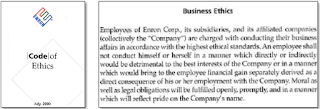On the complete opposite
end of the spectrum, The Body Shop can be examined. The Body Shop was formed in 1976, by the
entrepreneur Anita Roddick. Since the company started Anita has maintained a moral
and ethical code of values. The Body Shop produces and sells a full line of
body care products, including: lotions, shampoos, and facial cleansers. While
the products sold may be more expensive than other companies there is one big
shining reason why: The Body Shop only uses products that are farmed, gathered,
and produced using ethical practices. The Body Shop has the following list of five core values that they abide by as a corporation:
- · Against animal testing
- · Support of community fair trade products
- · Activating self-esteem in at risk populations
- · Defending human rights
- · Protecting the planet

Additionally, The
Body Shop has its own foundation, established in 1989. It provides funding for “small
innovative” charities. For example, they are currently funding the Build India
challenge. 30 volunteers are travelling to India to build a local community
center in order to support disabled children and their families.
Anita Roddick however, is not happy with her company abiding by ethical practices she fights for the rules to change, so that other companies must be ethical as well. For example, in the United Kingdom testing cosmetic products on animals was banned in November 1998, this was partly due to the lobbying by The Body Shop corporation. Additionally, The Body Shop has withdrawn from China due to their continuation with animal testing on cosmetic products.The Body Shop was also the first company to be recognized under the Humane Cosmetics Standard for their policies against animal testing on their products.
The company strives to maintain the highest standards in ethical production, most importantly in their community fair trade practices. The Body Shop creates a sustainable trading partnership for communities in need around the world. The Body Shop purchases raw ingredients from community farms around the globe at fair market value, in order to discourage slave labour, but also to directly help the communities that own the farms. Community fair trade is not just the fair trade and purchase of products, but also it supports small communities that own their own farms to produce their products, not simply large corporations who employ people to work there. Today, The Body Shop works with more than 30 suppliers in more than 20 countries in this fair trade initiative, and is responsible for the creation of over 25,00 fair trade jobs around the globe.
As you can see, every
label shows the consumer that the product is made of: “Community Fair Trade
virgin coconut oil”
Additionally, every label indicates that the
product was not tested on animals in any way, and where the product was
farmed/produced.
Another core value of The Body Shop is
activating self-esteem. The corporation achieves this trough marketing
techniques that do not sexualize women, but also through empowering individuals
to volunteer and feel good about helping others. It also supports a program
where employees have the opportunity to volunteer in the local and global
community to support groups in need.
The Body Shop also defends human rights
globally. Since 1994 The Body Shop has raised awareness on domestic abuse, and
has also raised over 4 million euros to support and protect abused women and
children. Not only that, The Body Shop has been involved in peaceful marches to
raise awareness and create government change in order to help support and
protect victims of abuse. The Body Shop also raises awareness on HIV and AIDS
in order to reduce the stigma attached to the disease. The also provide funding
and support for the Staying Alive Foundation, which is a youth target project
to raise awareness of safe sex, HIV and AIDS. Additionally, The Body Shop
supports campaigns to raise awareness of and reduce human trafficking.
The Body Shop is also committed to reducing
its carbon footprint, and protecting the planet. The Body Shop has committed to
reduce carbon dioxide emissions by 50%, and drastically reduce electricity use
in order to achieve the emission reduction standard they have set for
themselves. The Body Shop has also committed to reducing the waste produced
from various stages in production and sale of products, but also to reduce
water usage as well. Finally, The Body Shop has set up wildlife preserves at
all corporate sites, as well as fruit trees planted in an attempt to increase
biodiversity.
The Body Shop does not only sell quality
products, but ethically produced ones at that. The corporation believes in not
only producing ethical products but changing the laws in order to change
ethical practice for all companies. The Body Shop has gone above and beyond in
several facets, including ethical trade of products, and raising awareness of
several social issues. The Body Shop has displayed all of the qualities needed
to be an ethical company, through their five core values.
www.thebodyshopfoundation.org
http://www.thebodyshop.ca/en/values/EthicalTrade.aspx
Global – Corporate Social Responsibility at
the Body Shop


